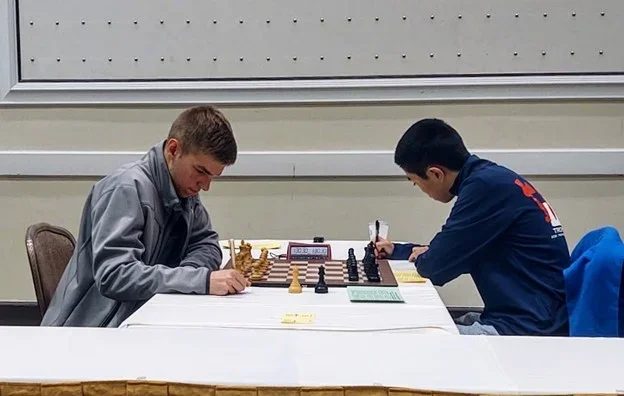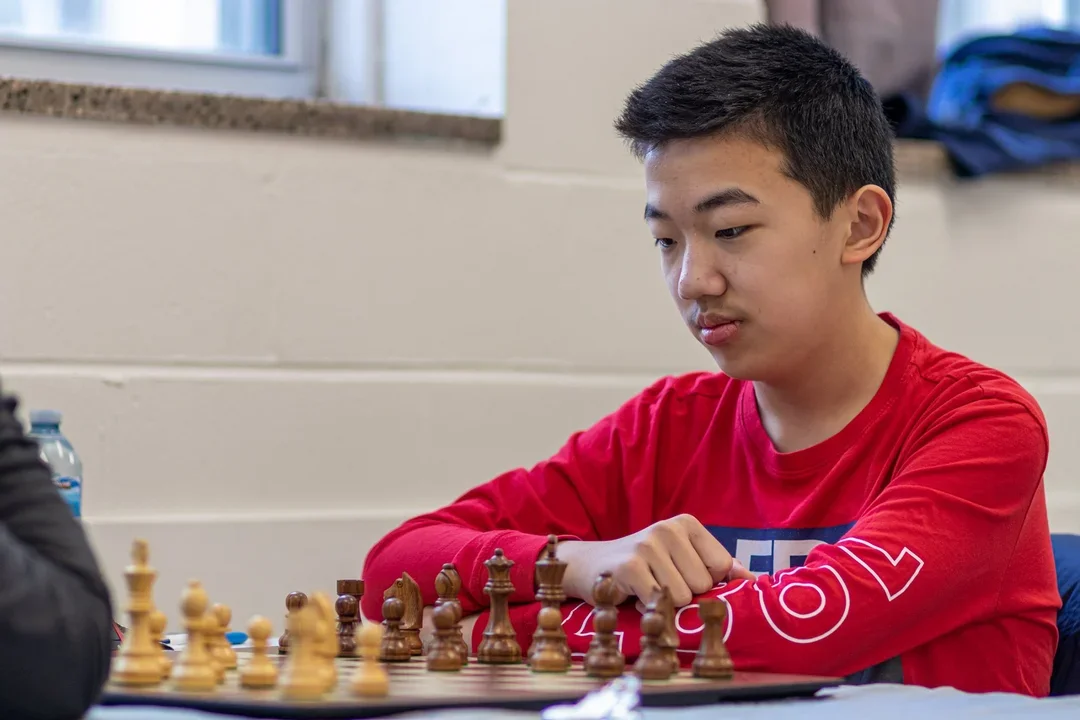More than 900 players joined the winter holiday fun in the 2022 North American Open held in the Horseshoe Hotel of Las Vegas, Nevada, from December 26-30. Polar vortex-induced weather conditions throughout much of the nation before the tournament limited even more players from joining, as the original entry count was 1000+ players.
The Vegas weather, on the other hand, was quite mild. Whereas parts of America were suffering from the coldest Christmas in decades, Vegas was pleasantly warm throughout the tournament.
I had played in this tournament every year since 2015, except for a gap year in 2016 and the pandemic-induced hiatus in 2020. Curiously, this event was held in a different but nevertheless beautiful playing hall this year, and I was excited to try my best in this new environment
The North American Open, with a $125,000 prize fund, has always been one of the strongest and most diverse open tournaments in the nation, and this year was no exception. This tournament attracted an extremely large international base, as players from over 26 countries participated. It also boasted over 50 titled players, including ten grandmasters, up three from last year.

Among the top seeds in the tournament were GM Mikhail Antipov, IM Semen Khanin, and GM Jianchao Zhou. Many strong juniors also participated, including IM Jason Liang, WIM Alice Lee, FM Joseph Levine, and FM Sandeep Sethuraman.
In the end, I won the Open section of the tournament with a score of 7½/9. Four players — GM Aleksey Sorokin, IM Jason Liang, GM Arman Mikaelyan, and GM Harshit Raja — shared second place with a score of 7/9.
The first three rounds in the tournament were not extremely dramatic in terms of tournament standings for higher-rated players. They did what they do best, separating themselves from the rest of the field. A few GMs were upset with losses, but for the most part, they gave up very few full points. I managed to win my first three rounds, although the games were far from flawless. My second round was completely egregious: I was lost after 16 moves after misremembering preparation, but I managed to swindle my way to a turbulent victory from there.
The fourth round, against 2514-rated IM Jason Liang, was the first time I played up in this tournament. Liang is a strong IM and likely soon-to-be GM, who has improved with rapid speed over the last few years. The game was quite dynamic, but just as I was feeling optimistic about my position, Liang surprised me with an excellent exchange sacrifice, changing the dynamic of the position. This move completely shattered my morale; even though the position was still complicated, I put up a very feeble defense and lost unpretentiously. As it turned out, however, this would be the only loss that I incurred in this tournament.
Liang was one of the two players on 3/3 that managed to win their game. By the end of the fourth round, the only two players with a perfect score were Liang and GM Viktor Matviishen. Just as the tournament was crossing the halfway point, these two individuals faced off on the top board in a complicated but well-played and objectively balanced draw. Liang was slightly better for most of the game but settled for a perpetual check after Matviishen accurately sacrificed an exchange.

Entering the third day of play, three players were tied for first with 4½/5. The top board in the sixth round featured two of the top seeds, Antipov and Matviishen. Matviishen played very well at the beginning of the game, achieving a winning endgame, but failed to convert the pawn-up position to a win.
On the second board, Liang had yet another interesting game, this time against Khanin. The game featured a complex Kings Indian battle, but ultimately Khanin navigated through the middlegame complications better.
I myself had quite a dynamic game in round 6 against Mikaelyan. Despite being completely surprised by the opening as early as the second move, I navigated through the opening complications quite well. But my time was quickly draining away, causing me to misplay the middlegame and gradually be outplayed into a losing position. Just as I was beginning to lose hope, however, Mikaelyan blundered into a devastating fork.
Going into round seven, five players were tied with 5/6. I had a relatively uneventful and short draw on board two against Khanin, but Antipov ground down GM Manuel Leon Hoyos on the first board in a five-plus hour game, taking the clear lead.

The eighth round was decisive, with almost no draws on the first ten boards. This was quite interesting because usually more draws occur near the end of the tournament on the top boards.
I was paired as black against talented Matviishen on board three. In the early stages of the game, I was consistently slightly worse, but I seized a chance when Matviishen made a dubious move allowing me to fork two pawns. From there, I managed to grind a crucial win in a rook and minor piece endgame.

The games of the first two boards were also very riveting, with both games featuring a queen sacrifice by one side. GM Aleksey Sorokin defeated the sole leader and top seed Antipov after an interesting but failed chance of activity by Antipov. GM Harshit Raja defeated Khanin with a very nice queen sacrifice in an otherwise rollercoaster game.
Finally, we entered the last day of the tournament. The other sections had already finished, since they only played seven rounds, so we had the huge ballroom all to ourselves. Four players — Sorokin, GM Vladimir Belous, Raja, and myself — were tied at 6½/8 and vying for the title of North American Open Champion. I had already secured my IM norm with a round to spare, but still, a mild thought persisted: if I were to win my game, I would not only win the tournament but also would have a remote chance of getting a GM norm. Later, however, I was sadly informed that my opponent’s average rating was not high enough for this to be a possibility, for I had played four lower-rated opponents in the first five rounds of the tournament, and the minimum required average rating for any GM norm consideration is 2380.
Contrary to expectations, I was not nervous when playing this game. I understood the night before that I was probably going to play against Belous, but even so, I decided not to prepare then. Instead, my friend and I went to In-N-Out Burger to enjoy a West Coast treat (for the fifth time that tournament, I might add). I just wanted to play my best chess, without caring too much about the final result. The next morning, I briefly looked at his games, prepared quite a nice line in the opening, and arrived at the board feeling confident.

Belous arrived slightly late to this game; by this time, the first board game between Sorokin and Raja had already ended in a quick draw.
Instead of playing a solid, positional line, I essayed a pawn sacrifice with the intention of gaining an attack against Belous’s king. This preparation worked magnificently well, and soon, Belous’s pieces were all pushed back to the edge of the board. Shortly after, I won an exchange and the game.
With that victory, I had successfully won the North American Open with a final score of 7½/9. This was a dream come true: after watching idols such as Awonder Liang win the tournament in previous years, I had wanted to be on the podium as well.
The first thing I did after my win was thank all my friends who were watching and supporting me vicariously for their motivation, faith, and words of encouragement, without which I believe I would not have done as well.
Then, after hanging out with my chess buddies for a while, it was time to part ways. As I was traveling back to Cincinnati, I started reflecting on my success in this tournament: was it luck, skill, or a combination of both? In the end, my ultimate resolution was that I certainly had my fair share of lucky moments, but I also dug deep and played resiliently when necessary. It truly was a holiday triumph in Vegas!
Categories
Archives
- January 2026 (2)
- December 2025 (27)
- November 2025 (29)
- October 2025 (39)
- September 2025 (27)
- August 2025 (29)
- July 2025 (43)
- June 2025 (25)
- May 2025 (24)
- April 2025 (29)
- March 2025 (29)
- February 2025 (20)
- January 2025 (24)
- December 2024 (34)
- November 2024 (18)
- October 2024 (35)
- September 2024 (23)
- August 2024 (27)
- July 2024 (44)
- June 2024 (27)
- May 2024 (31)
- April 2024 (51)
- March 2024 (34)
- February 2024 (25)
- January 2024 (26)
- December 2023 (29)
- November 2023 (26)
- October 2023 (37)
- September 2023 (27)
- August 2023 (37)
- July 2023 (47)
- June 2023 (33)
- May 2023 (37)
- April 2023 (45)
- March 2023 (37)
- February 2023 (28)
- January 2023 (31)
- December 2022 (23)
- November 2022 (32)
- October 2022 (31)
- September 2022 (19)
- August 2022 (39)
- July 2022 (32)
- June 2022 (35)
- May 2022 (21)
- April 2022 (31)
- March 2022 (33)
- February 2022 (21)
- January 2022 (27)
- December 2021 (36)
- November 2021 (34)
- October 2021 (25)
- September 2021 (25)
- August 2021 (41)
- July 2021 (36)
- June 2021 (29)
- May 2021 (29)
- April 2021 (31)
- March 2021 (33)
- February 2021 (28)
- January 2021 (29)
- December 2020 (38)
- November 2020 (40)
- October 2020 (41)
- September 2020 (35)
- August 2020 (38)
- July 2020 (36)
- June 2020 (46)
- May 2020 (42)
- April 2020 (37)
- March 2020 (60)
- February 2020 (38)
- January 2020 (45)
- December 2019 (34)
- November 2019 (35)
- October 2019 (42)
- September 2019 (45)
- August 2019 (56)
- July 2019 (44)
- June 2019 (35)
- May 2019 (40)
- April 2019 (48)
- March 2019 (61)
- February 2019 (39)
- January 2019 (30)
- December 2018 (29)
- November 2018 (51)
- October 2018 (45)
- September 2018 (29)
- August 2018 (49)
- July 2018 (35)
- June 2018 (31)
- May 2018 (39)
- April 2018 (31)
- March 2018 (26)
- February 2018 (33)
- January 2018 (30)
- December 2017 (26)
- November 2017 (24)
- October 2017 (30)
- September 2017 (30)
- August 2017 (31)
- July 2017 (28)
- June 2017 (32)
- May 2017 (26)
- April 2017 (37)
- March 2017 (28)
- February 2017 (30)
- January 2017 (27)
- December 2016 (29)
- November 2016 (24)
- October 2016 (32)
- September 2016 (31)
- August 2016 (27)
- July 2016 (24)
- June 2016 (26)
- May 2016 (19)
- April 2016 (30)
- March 2016 (36)
- February 2016 (28)
- January 2016 (32)
- December 2015 (26)
- November 2015 (23)
- October 2015 (16)
- September 2015 (28)
- August 2015 (28)
- July 2015 (6)
- June 2015 (1)
- May 2015 (2)
- April 2015 (1)
- February 2015 (3)
- January 2015 (1)
- December 2014 (1)
- July 2010 (1)
- October 1991 (1)
- August 1989 (1)
- January 1988 (1)
- December 1983 (1)







